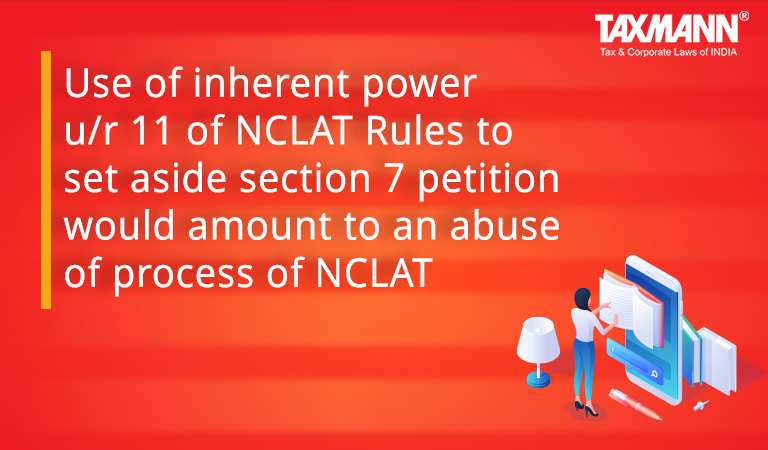Use of inherent power u/r 11 of NCLAT Rules to set aside section 7 petition would amount to an abuse of process of NCLAT
- Blog|News|Insolvency and Bankruptcy Code|
- 2 Min Read
- By Taxmann
- |
- Last Updated on 22 December, 2021

Case Details: Harish Raghavji Patel v. Shapoorji Pallonji Finance (P.) Ltd. - [2021] 133 taxmann.com 183 (NCLAT- New Delhi)
Judiciary and Counsel Details
-
- Jarat Kumar Jain, Judicial Member and Dr. Alok Srivastava, Technical Member
- Abhijeet Sinha, Nitin Mishra, Ms. Mitali Gupta and Sumit Shukla, Advs. for the Appellant.
- Arun Kathpalia, Sr. Adv., Kunal Kanungo, Abhijit Ghokale, Amey Hadwale, Advs., Prakash Shah and Durgaprasad Poojari for the Respondent.
Facts of the Case
The Adjudicating Authority by an impugned order admitted petition against appellant corporate debtor filed by financial creditor under section 7 of the IBC. The Appellant filed an appeal against the impugned order and submitted that before the constitution of the CoC, the settlement had been arrived at between parties and therefore, prayed that terms of settlement may be taken on record. It was further submitted that Appellate Tribunal exercising inherent power under rule 11 of NCLAT, Rules, 2016 could set aside impugned order and quash CIRP against the corporate debtor in terms of the settlement.
NCLAT Held
The NCLAT held that the inherent power can be exercised only when no other remedy is available to the litigant and nowhere a specific remedy is provided by statute. The NCLAT ruled that since the procedure for withdrawal of petition under sections 7, 9 or 10 of the IBC before and after Constitution of CoC had been provided in section 12A, there was no justification to invoke inherent power of this Appellate Tribunal and to take on record terms of settlement and pass an order for withdrawal of petition under section 7. Therefore, exercising inherent power under rule 11 would amount to an abuse of process of the Appellate Tribunal, hence, could not have been allowed, ruled NCLAT.
Case Review
-
- Shapoorji Pallonji Finance (P.) Ltd. v. Rajesh Construction Company (P.) Ltd. [2021] 133 taxmann.com 182 affirmed [See Annex].
- Swiss Ribbons (P.) Ltd. v. Union of India [2019] 101 taxmann.com 389/152 SCL 365 (SC) (para 9)
- Brilliant Alloys (P.) Ltd. v. S. Rajagopal [Special Leave to Appeal (c) No 31557 of 2018, dated 14-12-2018] (para 9) and
- Kamal K. Singh v. Dinesh Gupta [Civil Appeal No. 4993 of 2021, 25-8-2021] (para 9) distinguished.
List of Cases Referred to
-
- Swiss Ribbons (P.) Ltd. v. Union of India [2019] 101 taxmann.com 389/152 SCL 365 (SC) (para 3)
- Brilliant Alloys (P.) Ltd. v. S. Rajagopal [Special Leave to Appeal (c) No. 31557 of 2018, dated 14-12-2018] (para 3)
- Kamal K. Singh v. Dinesh Gupta [Civil Appeal No. 4993 of 2021, dated 25-8-2021] (para 3)
- Anuj Tejpal v. Rakesh Yadav [2021] 129 taxmann.com 296 (NCL – AT) (para 3).
Disclaimer: The content/information published on the website is only for general information of the user and shall not be construed as legal advice. While the Taxmann has exercised reasonable efforts to ensure the veracity of information/content published, Taxmann shall be under no liability in any manner whatsoever for incorrect information, if any.

Taxmann Publications has a dedicated in-house Research & Editorial Team. This team consists of a team of Chartered Accountants, Company Secretaries, and Lawyers. This team works under the guidance and supervision of editor-in-chief Mr Rakesh Bhargava.
The Research and Editorial Team is responsible for developing reliable and accurate content for the readers. The team follows the six-sigma approach to achieve the benchmark of zero error in its publications and research platforms. The team ensures that the following publication guidelines are thoroughly followed while developing the content:
- The statutory material is obtained only from the authorized and reliable sources
- All the latest developments in the judicial and legislative fields are covered
- Prepare the analytical write-ups on current, controversial, and important issues to help the readers to understand the concept and its implications
- Every content published by Taxmann is complete, accurate and lucid
- All evidence-based statements are supported with proper reference to Section, Circular No., Notification No. or citations
- The golden rules of grammar, style and consistency are thoroughly followed
- Font and size that’s easy to read and remain consistent across all imprint and digital publications are applied



 CA | CS | CMA
CA | CS | CMA
